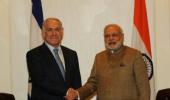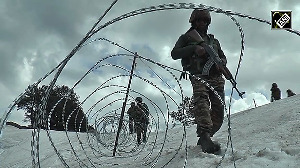In an interview to pro-government daily ‘Israel Hayom’, the PM said his visit -- the first ever by an Indian premier -- was “based on the deep centuries-old connection between our two peoples.”

Prime Minister Narendra Modi on Monday described India’s ties with Israel as “special” and said his visit -- the first-ever by an Indian premier to the country -- will “lead to further cementing” of bilateral ties and cooperation in key areas including counter-terrorism.
“My visit comes at a special moment --we mark 25 years of the establishment of relations between India and Israel this year,” Modi said on the eve of his three-day visit to Israel.
In an interview to the pro-government daily ‘Israel Hayom’, Modi said his visit was “based on the deep centuries-old connection between our two peoples.”
“I share the opinion of many of my people, who see Israel as a beacon of technology, as a country that has managed to survive even though the odds were against it.”
Modi’s visit is expected to focus on forging new defence and cyber security ties, two areas in which Israel has sought to portray itself as a world leader, the daily said.
Separately, in an e-mail sent to Israelis who subscribe to his newsletter, Modi said India’s ties with Israel are “special.”
Modi said his visit will “lead to further cementing” the ties between the two countries, according to Jerusalem Post.
India is the world’s biggest importer of defence equipment, and Israel has become one of its major suppliers. Israeli media have reported that the two countries see more than $1 billion in defence deals each year.
Modi said his government is determined to improve ties between India and Israel and raise them to new levels.
Noting that the frequency of high-level exchanges has gone up over the last three years, Modi said that no Indian president or prime minister had visited Israel before President Pranab Mukherjee visited in 2015.
“My visit has its own significance as this is the first time ever that an Indian PM is visiting Israel. I am confident that my visit will lead to further strengthening of our relations in different areas and also open up new priorities for cooperation,” Modi told ‘Israel Hayom’.
“Our goal is to conduct dialogue with Israel in a manner that improves the lives of the citizens of both countries,” said Prime Minister Modi, who last visited Israel a decade ago when he was chief minister of Gujarat with a delegation to learn about Israeli agriculture.
“I am happy to return after more than a decade, and I look forward to seeing the developments and advances Israel has made in this time,” Modi said.
He lauded Israel for transforming itself from being a water-deficient country to a water-surplus country and hailed its other amazing accomplishments.
Asked whether Israel and India facing the same threat of terrorism, Modi said that terrorism is a global menace and two countries are not immune to it either.
“We are in full agreement that elements which perpetrate violence on innocent people should not be allowed to flourish. Cross-border terrorism is a major challenge for us. Divisive forces across our border are trying to disrupt the unity of our nation.
“These troublemakers often misuse religion as a tool to misguide youth in our country and our regions. Terrorism should not be equated with any particular religion. India and Israel could cooperate even more closely and complement each other’s efforts to fight with the menace of terrorism,” he told the Israeli daily.
When asked whether he is ardent supporter of the capitalist system and wants to liberalise the economy, Modi said he does not believe in any ‘isms.’
“I, and my government work with the motto of ‘Together with all, development for all,” he added.
Modi said Israel could be a technology partner in the process of India’s transformation.
“Israel’s capabilities offer a good match for our flagship schemes like Clean Ganga and SmartCities. Israeli technologies could also be used to improve the quality of lives of hundreds of thousands of people in our country if Israeli innovators remodel their products according to the needs of our rural population,” he added.
“We are not looking at a traditional import-export relationship with Israel. It is more than a buyer-seller relationship. We are more interested in a tech-based partnership with an emphasis on ‘Make in India’,” he added.











 © 2025
© 2025